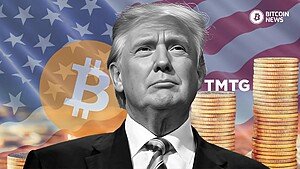In a bold move highlighting the increasing acceptance of Bitcoin, biopharmaceutical company Hoth Therapeutics has announced plans to allocate $1 million to bitcoin (BTC) as part of its treasury reserves.
This decision reflects the growing trend of institutional interest in Bitcoin as a reliable store of value and a hedge against inflation.
Hoth Therapeutics, a Nasdaq-listed biopharmaceutical firm based in the United States, revealed that its Board of Directors unanimously approved this decision.
The company’s CEO, Robb Knie, emphasized Bitcoin’s appeal in the current economic landscape, stating:
“As Bitcoin continues to grow, gaining investor attention and acceptance as a major and primary asset class, we believe it will serve as a strong treasury reserve asset.”
He pointed to Bitcoin’s inflation-resistant properties and increasing institutional adoption, including the approval of Bitcoin Exchange-Traded Funds (ETFs), as key factors influencing the decision.
According to Knie, the move aims to strengthen the company’s financial strategy while keeping its primary focus on advancing its biopharmaceutical pipeline.
Hoth’s announcement comes amid a wave of corporate adoption of Bitcoin. The company joins others in the biotech space, such as Acurx Pharmaceuticals and Enlivex Therapeutics, which have also committed $1 million each to bitcoin for their treasury reserves.
Acurx Pharmaceuticals CEO David Luci explained the decision, saying, “As demand for bitcoin grows and so does its acceptance as a major asset class, we believe bitcoin will serve as a strong treasury reserve asset for cash not needed over the next 12 to 18 months.”
These companies are inspired by the success of pioneers like MicroStrategy, which has invested billions into bitcoin, as well as growing institutional support from figures like Donald Trump and Senator Cynthia Lummis.
Bitcoin’s rising status as a treasury reserve asset is not just limited to private companies.
Public figures such as Robert F. Kennedy Jr. and Senator Lummis have called for integrating bitcoin into national financial strategies. Lummis recently proposed converting a portion of the United States’ gold reserves into bitcoin, signaling a potential shift in U.S. fiscal policy.
Bitcoin has also made significant strides in market valuation. It recently surpassed the market capitalizations of silver and Saudi Aramco, and its value is now comparable to major financial giants like Visa and Mastercard.
The scarce digital asset’s price has surged past $98,000 due to increasing geopolitical factors and renewed market optimism, particularly after Donald Trump’s victory in the 2024 U.S. presidential election.
The decision to invest in bitcoin is largely driven by its perceived ability to hedge against inflation.
With a fixed supply of 21 million coins, bitcoin is often seen as “digital gold.” Companies like Hoth Therapeutics view it as a way to preserve value amidst economic uncertainties.
Experts see these moves as part of a larger shift in how companies manage their financial reserves. By integrating bitcoin into their strategies, businesses are not only diversifying their assets but also signaling confidence in the digital asset’s future.
Hoth Therapeutics’ decision is being closely watched, with industry analysts predicting that more companies may follow suit. The company’s move highlights the growing prevalence of bitcoin in corporate treasury management.
Related: Solidion Technology Joins Bitcoin Adoption Wave with Bold Treasury Move
Hoth Therapeutics’ $1 million bitcoin investment might be smaller in scale compared to giants like MicroStrategy, but it represents a significant step in the adoption of the digital asset by smaller, innovative companies.
As more firms, particularly in the biotech sector, recognize bitcoin’s potential as a treasury reserve asset, the trend of integrating it into financial strategies is likely to accelerate.
For companies like Hoth Therapeutics, bitcoin is no longer just a speculative asset—it’s becoming an essential part of their financial toolkit. This marks yet another milestone in Bitcoin’s journey from a niche digital currency to a mainstream financial instrument.










